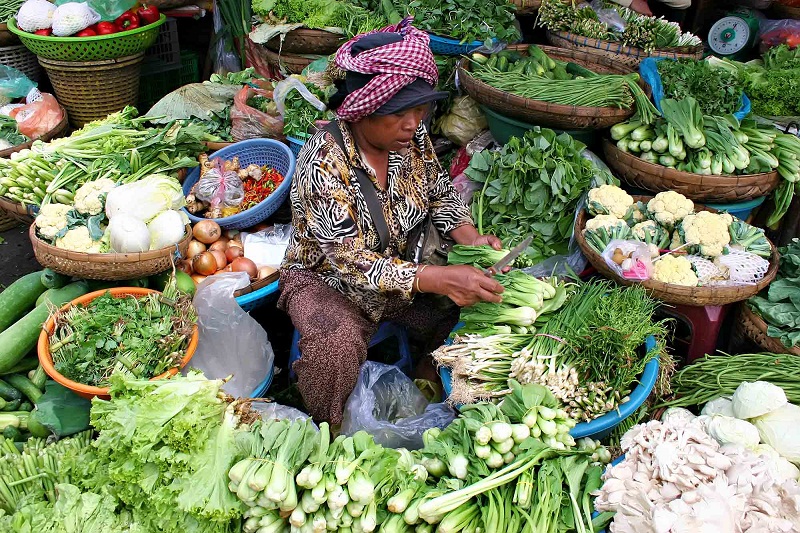Ghana has lost about US$30 million in revenue as a result of the ban on vegetable exports into the European Union (EU).
The amount was lost between the period 2014 and 2017 when the country was found to be non-complaint with the EU standards on the export of vegetables.
However, in its quest to reverse the ban, the government has put in place the requisite measures in anticipation of a team from the Food and Veterinary Office of the EU that is expected in the country in September this year to assess the quality of Ghana’s vegetables and possibly reverse the three-year export ban to the EU.
In what is expected to be welcome news to players in the industry, a highly placed source at the Ministry of Food and Agriculture (MoFA) told the GRAPHIC BUSINESS last Wednesday, in Accra that the government had upgraded sanitary and phytosanitary systems after the weak system earned the country a ban on exports of five vegetables which included capsicum, solanum species-aubergines, momordica, luffa and lagenaria (gourd family) after failing an assessment in 2015 due to high levels of interceptions in the EU market.
For instance, the source, who spoke on grounds of anonymity, said the Kotoka International Airport (KIA) had now been equipped to facilitate exports of vegetables to the EU market. A requisite measure has been put in place to facilitate the work of the EU team after which a positive result is highly anticipated.
The source, which is also a member of a task force put in place to ensure that the ban is lifted, explained that work was also underway to streamline the horticultural value chain to help Ghana overturn the EU ban.
“Today, there are a lot of infrastructure upgrades at the airport which include upgrading inspection facilities, personnel improvement, modern equipment all geared towards ensuring the lifting of the ban,” the source said.
“The EU has put in place certain conditions based on which the ban will be lifted. So we are making sure that the actions will be taken. In addition to that, we are taking steps to comply with the EU’s regulations and also trying to restructure our own internal arrangements, as well as getting the right personnel manning activities at the ports of entry and in the various regions.”
“So I am very confident that with all the work we have done so far, in collaboration with the stakeholders, we are prepared now to receive the delegation from the EU to assess us in mid-September so that the ban can be lifted to enable business to go on,” it added.

The EU ban
The EU in October 2014 banned the export of gourds and Asian vegetables such as chillies, aubergine and other vegetables from Ghana to its markets because of suspicions that the farm produce were infested with pests and therefore, were being introduced into the ecosystem of the EU.
The ban has resulted in the country losing more than US$30million in export revenue from five selected vegetables banned from entering into the EU market.
To help overturn the fortune, the government says it is deploying the needed mechanisms through the horticultural value chain to help Ghana to overturn the EU ban.
Towards that end, the government has upgraded sanitary and phytosanitary systems at the country’s export point of exit to ensure the ban is reviewed.
The task force that is ensuring that the ban is reversed says it has now put in place the right mechanisms which include upgrading exporting facilities at the Kotoka International Airport (KIA) and skills of Plant Protection And Regulatory Services Directorate (PPRSD) inspectors to pave the way for the ban on these five vegetables to be reversed.
{loadmodule mod_banners,Nativead1}
Likely implication
The vegetable producers have explained that lifting of the ban will not only increase revenue for the government but also revive the business of exporters and farmers who lost their business when the ban was slapped on Ghana in 2014.
The Managing Partner of JEGS Company Limited, an indigenous pepper processing start-up, Mr Samuel Gyan, said lifting of the ban would help overturn the fortunes of the vegetable industry in Ghana.
With high optimism about the ban being lifted, Mr Gyan observed that once the ban was lifted, the government must also put stringent measures in place to prevent a recurrence of the situation that led to the deterioration of the facilities at the KIA.
“Lifting of the ban will be able to make the vegetable industry in Ghana very viable and help grow the agricultural sector in general,” he said, and added that, “the five main vegetable produce that have been banned have made industry players quite stranded over the past two years.”
High optimism
Mrs Rita Appiah, a vegetable exporter who went out of business as a result of the ban, said she had already started putting the necessary measures in place to begin exporting again into the EU market once the ban was lifted.
Mrs Appiah, who exported chillies, aubergine and other vegetables from Ghana in large quantities into the EU market but went out of business as a result of the ban said, “Before the ban, Ghana used to be the fifth exporter of fresh vegetables to the EU market and we are hopeful that once the ban is lifted within a period of one year, the fortune of the industry will be overturned.”
